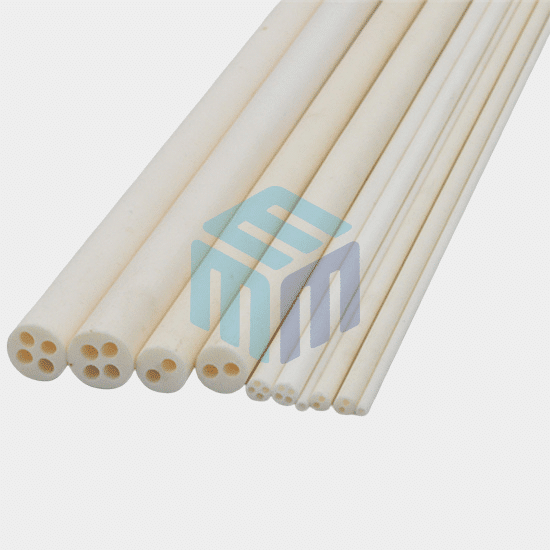Alumina tubes are widely used in various high-temperature and industrial applications due to their excellent properties, including high thermal stability, chemical resistance, and mechanical strength.
Here are some of the key applications of alumina tubes:
- Thermocouple Protection Tubes
- Purpose: Alumina tubes are often used to protect thermocouples in high-temperature environments, where they serve as shields for the sensors against corrosive gases, molten metals, and other harsh conditions.
- Industries: Foundries, metal processing, and power generation facilities rely on alumina tubes to safeguard temperature sensors for accurate readings in extreme environments.
- Furnace Tubes
- Purpose: Alumina tubes are utilized as heating elements or lining materials in industrial furnaces. Their high-temperature tolerance (up to 1800°C or more) and low thermal conductivity make them ideal for use in both electric and gas-fired furnaces.
- Industries: Widely used in industries like metallurgy, glass manufacturing, ceramics, and heat treatment processes.
- High-Temperature Insulators
- Purpose: Alumina tubes are excellent electrical insulators and are used to protect electrical wiring and components in high-temperature applications.
- Industries: Electronics manufacturing, semiconductors, and aerospace industries benefit from alumina tubes’ insulating properties in high-heat environments where electrical isolation is necessary.
- Kiln Furniture and Support Rods
- Purpose: In ceramic and glass production, alumina tubes are used as support rods, beams, or kiln furniture to hold materials during firing processes at high temperatures. Their durability ensures they can withstand repeated use without deformation.
- Industries: Ceramic manufacturing, including tiles, pottery, and advanced ceramics.
- Chemical Processing
- Purpose: Alumina tubes are resistant to corrosion from many chemicals and are used in applications requiring high-purity containment and transport of reactive or corrosive chemicals at elevated temperatures.
- Industries: Chemical processing, petrochemical, and pharmaceutical industries use alumina tubes to handle aggressive chemical reactions and protect against contamination.
- Catalyst Support Tubes
- Purpose: Alumina’s porosity and thermal properties make it an ideal material for catalyst support in chemical reactions, particularly in processes that require high-temperature catalytic reactions.
- Industries: Oil refining, petrochemical production, and environmental technology use alumina tubes in catalytic converters and reactors.
- Diffusion and Vacuum Tubes
- Purpose: Alumina tubes are used in diffusion furnaces for semiconductor manufacturing and vacuum environments due to their high strength, purity, and resistance to oxidation.
- Industries: Semiconductor production, electronics, and advanced material research.
- Sample Handling in Scientific Research
- Purpose: In laboratories, alumina tubes are used to handle and contain materials during high-temperature experiments, sintering processes, or in environments where sample purity must be maintained.
- Industries: Research institutions, universities, and scientific labs.
- Powder Processing and Gas Flow Tubes
- Purpose: Alumina tubes are used in powder processing applications and for directing gas flows in high-temperature processes. Their durability and resistance to wear make them ideal for prolonged exposure to abrasive particles or hot gases.
- Industries: Powder metallurgy, additive manufacturing, and material synthesis industries.
- Medical and Dental Applications
- Purpose: Alumina tubes are used in specialized medical and dental equipment for their bio-inert properties and ability to withstand sterilization at high temperatures.
- Industries: Medical devices, dental implant production, and high-temperature sterilization equipment.
- Wear-Resistant Linings
- Purpose: Due to their hardness and resistance to abrasion, alumina tubes are sometimes used as linings in areas exposed to heavy wear, such as slurry transport, pipelines, or milling equipment.
- Industries: Mining, chemical processing, and material handling.
- Gas and Fluid Transport at High Temperatures
- Purpose: Alumina tubes are employed to transport gases and liquids in high-temperature and corrosive environments where other materials would fail or degrade.
- Industries: Power generation, oil and gas industries, and environmental technologies.
Alumina tubes are versatile and play an important role in applications where durability, high-temperature performance, and resistance to corrosion or contamination are critical. Their wide range of industrial and scientific uses makes them essential in processes that require reliability and precision
M-Kube Enterprise is an Indian company catering customized laboratory products, laboratory consumables, and laboratory solutions in India, Australia, the USA, New Zealand, Singapore, Malaysia, South Korea, Dubai, the Philippines, Indonesia, and Vietnam.






